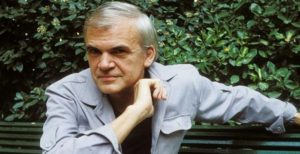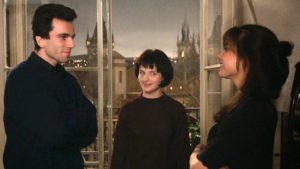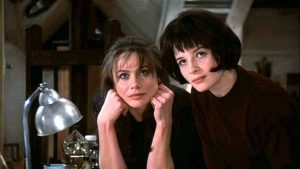How often do we have the chance to enjoy the scenes on the big screen that conceal the magnificent literary template, exquisite cast, and even better music? Today we will reveal or maybe just remind you of one of such realizations, filmed 30 years ago – the movie ”Unbearable lightness of being”.
In the far-away year of 1984., the novel with the same name by one of the most appreciated world literates, Milan Kundera, saw the light of the day. Although in the Czech language, the book was published in France, which was understandable having in mind a few things – as a writer and an intellectual, Kundera was very engaged during the well-known movement called the Prague spring. After turbulent political happenings and Russian occupation of Czechoslovakia in 1968., Kundera loses his job and his position at the Prague Film Academy, where he had taught world literature. The only two books he has published until 1970 – ”Joke”, ”Laughable loves” – were withdrawn from the book stores and libraries, and later works were forbidden in his homeland, even to the 90’s. That didn’t stop him from publishing his works in France where he has lived and taught since 1975. Actually, one could say that in the ’80s Kundera did for Czechoslovakia the same thing Marquez did for Latin America earlier in the 60’s – he managed to represent the literature of his homeland to the western audience. And with great success, as one critic noted: ”Back in ’80s, absolutely everyone was reading the ‘Unbearable lightness of being’ and the ‘Book of Laughter and forgetting’.”

It is interesting that at that time, due to the aforementioned politic situation, Czechoslovakia lost another great artist – the director Milos Forman. Unlike Kundera, Forman will go to America where he will later create cult movies like the ”Hair”, ”One Flew Over Coo-coo’s Nest”, ”Amadeus”… Quite expected, the direction of the ”Unbearable lightness of being” was first offered to him, however, he turned it down because of personal reasons (his two children still living in Prague). And so, after Philip Kaufman takes the director’s job, the film path of Kundera’s story begins.
His ‘novel about love, but not a love novel’ as Viskovic described it in the magazine ”Danas”, actually is the ”love story out in the context of the Prague spring in 1968. and the Soviet occupation that followed”. In Kaufmann’s director vision, political and social context stays in the second plan, while the accent is on the complex love triangle between Tomas – the great seducer, the everlasting curious observer and explorer of the woman’s body; his loved wife Teresa and the only Tomas’s lover that has a name – Sabina (probably the closest of all to freedom and lightness from the title). The international and more than interesting cast was formed by young actors: British Daniel Day-Lewis, French Juliette Binoche and Swedish Lena Olin.

Although the studio shots were taken in Paris where Kundera still lives, he didn’t want to be present. The director Kaufmann remembers how the writer picturesquely explained that it would be ”like a father watching his daughter make love”. Still, his subtle presence was felt everywhere. On another occasion, Kundera was asked ”Does a life rich in experience make your novels autobiographical?”, and he replied: ‘‘No character in my novels is a self-portrait, nor are any of my characters the portrait of a living person. I don’t like disguised autobiographies. I hate writer indiscretions. For me, indiscretion is a capital sin. We live in an age when private life is being destroyed.”

At last, one more thing that will complete your enjoyment in the movie with subtle conviction is the music of the Czech composer Leoš Janáček. It was, of course, Kundera’s wish, because it is the composer he had admired his whole life. This is mainly because of his father that was a pianist and a musicologist who knew Janáček in person and continuously performed his music. So, Milan Kundera had the privilege to grow up with the works of the ”biggest Czech composer”. It is interesting that he devoted a whole chapter to Janáček in his book ”Encounter”, with the sweet title ”My first love”, where he explains how his homeland is permanently written in his aesthetic genes with Janáček’s music.
The secret of Janáček’s music lays maybe in the idea that his pieces represent people how they really are and not in their best ”edition”, as Alex Ross wrote in The rest is noise. For that reason, although there is plenty of good classical and popular music in the movie, Janáček’s themes naturally became light motifs of the main characters – the ordinary people with all their flaws and virtues. The first time Tomas sees Teresa jumping in the pool, disturbing with the downfall of the game of chess played by the comic men standing around the board, we can hear the gentle tones of the piano melody The holy virgin of Frydek, that will become Teresa’s theme. Unlike her’s, Tomas’s theme, which is heard at the very beginning of the movie, counterpoints perfectly his unsteady nature and ”erotic friendships”.
It is also interesting to notice how relations between characters change along with the new musical themes. For example, when Tomas and Sabina meet again after a while, we won’t hear the recognizable motif of Tomas, but the beginning of Janacek’s quartet Intimate letters that emphasizes the lust we are witnessing on the screen with much more passion and whirl. Emotional turns are always followed by music, so the piano theme The Barn owl has not flown away depicts more successive scenes – the moment when Sabina’s lover finds her studio empty while she makes love with Tomas for the last time; Tomas’s return to home and facing Teresa’s goodbye letter.
No matter whether you prefer the written word or motion pictures, step in Kundera’s universe (again) and let the ‘unbearable’ brightness of his pen contribute to the lightness and the beautifulness of your existence.
Svetlana Trtica